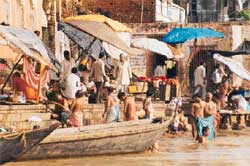Pollution of Hinduisim
 Every Hindu worth his/her salt will recount the story to you. When Lord Krishna was born, his father put him in a basket and crossed the Yamuna to reach the avatar of Vishnu to safety in the house of Yashoda and Nand. This was to escape the cruelty of Kansa, the evil uncle of Lord Krishna. All the tales of Lord Krishna's childhood have beautiful imagery of the Yamuna. In fact, in most Hindu minds, Yamuna and Krishna go together.
Every Hindu worth his/her salt will recount the story to you. When Lord Krishna was born, his father put him in a basket and crossed the Yamuna to reach the avatar of Vishnu to safety in the house of Yashoda and Nand. This was to escape the cruelty of Kansa, the evil uncle of Lord Krishna. All the tales of Lord Krishna's childhood have beautiful imagery of the Yamuna. In fact, in most Hindu minds, Yamuna and Krishna go together.
But take a look at the river now.
What if Lord Krishna were to come today and his father were to take him across the Yamuna! The putrid stench emanating from the water would be unbearable. And if the child Krishna were to sip the water, he would need to summon all the supernatural powers at his disposal to stay alive. The Yamuna has been polluted beyond imagination, mostly by those claiming to be Lord Krishna's devotees.
Keep flowing with the Yamuna till Allahabad, where it meets the river that is more than a mother to every devout Hindu, the Ganga. Go further downstream to arrive at the capital on the map of Hindu belief, the city of Varanasi. What this town in eastern Uttar Pradesh means to a Hindu cannot be explained to people from other cultures, especially not in a foreign language. It can only be hinted at by the fact that Hindus from across the country come to die here. Because death here means moksha , the ultimate freedom - a release from the cycle of birth and rebirth, a release from maya , the temporal world of the senses. The Hindu spiritual realm has, for millennia, been a world where contradictions can be reconciled. A world that any common person can resort to as a point of reference while sorting out and managing the problems of the real world in a real manner.
But use your eyes in today's Varanasi. Use your nose, your skin, the very senses of maya. And they comprehensively ruin any spiritual experience that you may be capable of. The filth of the sensory world assaults the mind so that any refined encounter with the sublime is crushed beneath the miseries of the material world. One is reminded of the encounter that the young prince Gautam had with the sufferings of the world in the 5th century bc , which resulted in the young prince walking out and founding what we today call Buddhism.
On the Manikarnika Ghat in Varanasi, standing on a platform overlooking about ten funeral pyres, one confronts what 'devout' Hindus have learned to ignore. Local people will tell you that this ghat, one of the 80 others in the erstwhile centre of scholarly learning, Kashi, gets about 80 bodies from neighbouring towns and villages for cremation every day. As a body arrives, a dom (cremator) takes charge of it. After the cremation, the ashes are supposed to be immersed in the Ganga. However, the dom s here do not have much time. Other bodies are lining up for cremation. One of the dom s takes a half-burnt part of a body and throws it into the Ganga. The body makes a splash. Some drops reach a person taking a holy dip in the Ganga and chanting verses for the eternal peace of ancestors.
Surely, this cannot be the edifice that has come up on the foundations of Hinduism. A river that is so sacred cannot be desecrated like this - and by its own devotees. Yet most Hindus do it. If we look at the practices and rituals that we carry out in the name of Hinduism, most are not even remotely connected to the teachings of the Vedas or the Bhagwad Gita. "Hindus have become champions at raping their own mother," laments Swami Srivatsa Goswami, a Vrindavan-based scholar.
The philosophy that is not practised
Conserve ecology or perish - this, in short, is one of the messages of the Gita , one of the most important scriptures of the Vedic way of life now known as Hinduism. The four Vedas and the Gita are two of the canons of Hinduism. "Vedas are fundamental to Hinduism, not the gods. The environment is seen as a part of one's family here," says Veer Bhadra Mishra, head of the civil engineering department of the Benaras Hindu University (bhu) in Varanasi, Uttar Pradesh. He is also the mahant (priest) of the Sankat Mochan temple in Varanasi.
"Throughout the human life, one only draws from nature in the form of the various natural resources. The Gita stresses the concept of yaj
